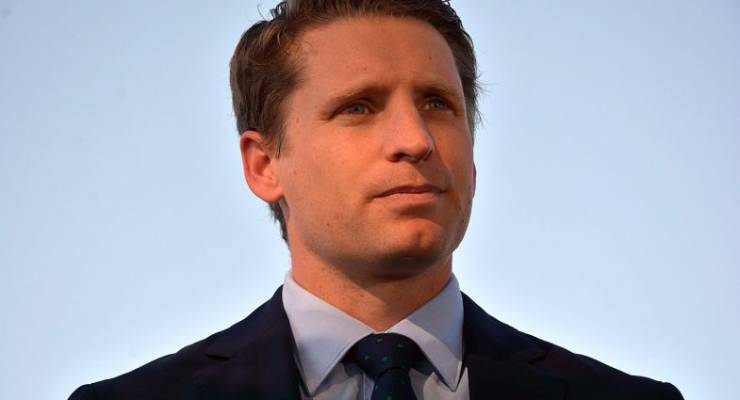
The head of Parliament’s intelligence committee has thrown a stick of dynamite into the government’s efforts to improve its “tense” relationship with China, naming Australian-Chinese businessman Chau Chak Wing as an unindicted co-conspirator, “CC-3” in a US bribery case.
Last night, West Australian MP Andrew Hastie, who heads the Parliamentary Joint Committee on Intelligence and Security (PJCIS), told the Federation Chamber:
It is now my duty to inform the House and the Australian people that CC-3 is Dr Chau Chak Wing, the same man who co-conspired to bribe the president of the United Nations General Assembly, John Ashe, the same man with extensive contacts in the Chinese Communist Party, including the United Front. I share it with the House because I believe it to be in the national interest.
Chau — a prolific donor to both sides of politics, which Hastie readily noted — is currently suing a number of Australian media outlets who have identified him as CC-3. Hastie’s speech identifying Chau is lengthy and detailed, and included the tabling of both the unsealed indictment and a State Department cable, which linked Chau, under his Mandarin name, to China’s “United Front” efforts to exert Beijing’s influence in other countries.
It didn’t take Beijing long to react. The hysterical government tabloid Global Times this morning ran a demand that it was “time to cool Sino-Australian ties”, possibly for several years. “For example, it will not be necessary for the Australian Prime Minister to visit China this year. In fact, he could visit a few years later.”
Indeed, it lays out a program of retribution against Australia — iron ore imports will be untouched, as will Chinese students studying here, and tourism, “but when it comes to wine and beef, China can easily import those items from the US, replacing Australia”. “The scope of import reductions could be limited,” it goes on. “Last year, Australia exported $76.45 billion in goods to China. Lowering Aussie exports by $6.45 billion would send cold chills up and down the spine of Australia. Of course, it would be an even greater shock if the import reductions totaled $10 billion.”
Up until Hastie rose yesterday evening, the government had been at pains to claim that while the relationship with China was occasionally tense, it was still “warm”, that Julie Bishop had just had a meeting with the Chinese foreign minister at a G20 meeting in Argentina and that Turnbull was planning to visit China later this year.
Under questioning from Labor’s shadow foreign minister Penny Wong at estimates, Turnbull’s national security deputy secretary Allan McKinnon yesterday was adamant that the relationship with China was indeed warm — despite Foreign Minister Wang Yi going out of his way to chip Australia after his meeting with Julie Bishop, and stories that Australian imports were being deliberately held up Chinese border authorities.
Why did Hastie blow up his own government’s efforts to warm relations again with Beijing? A good guess is that it was at the behest of the American intelligence establishment (the PJCIS has good relations with US intelligence officials, and their political masters in Congress), which provided Hastie with the material he produced yesterday.
The Trump administration might be badly factionalised over China policy, but the US intelligence community is of one mind on China: it is a threat, and must be countered. This is the case even at the temporary political inconvenience of the Turnbull government, which has otherwise been solid in backing the US against Chinese regional aggression, and in challenging Chinese efforts at domestic interference. Indeed, it’s done so to such an extent that the China lobby has demanded Julie Bishop’s sacking.
The fact that Hastie is aligned strongly with the right wing of the Liberals, who are no friends of Turnbull and particularly Julie Bishop, might have acted to remove any reservations Hastie might have had about inconveniencing his own government. Ironically, the result is to bring the same sort of divisions over China that currently characterise the Trump administration to the Turnbull government.
Hastie might be justified, though: a cooling of our relationship with China, even at the cost of some wine and beef exports (so much for our much-heralded free trade agreement negotiated by Tony Abbott) would at least make for a more honest relationship.
China is a vast human rights abuser, a threat to regional stability, and tries constantly to interfere in our domestic politics, even if it generally fails to achieve anything. We should be blunt about that.








The US doesn’t need to send us an ambassador to promote their interests, Andrew Hastie’s here.
This is a pretty clear indication of the US interfering in our domestic politics one could just as easily say. I doubt this is going to end well for Australia. Nuance left the building some time ago.
On the day that Ms Bishop was bending over backwards to assuage the Chinese Foreign Minister young Mr Hastie comes out with this – I suspect that he has been a little hasty (comments open late last night but closed early this morning in Fairfax publications – shades of a ‘D – Notice’!!). I wonder if his PM, Foreign and Defence Ministers and other members of his committee and the security agencies were aware of what he was about to say – I bet not!!! I will however bet my last lazy ten bucks that Abbott knew. If the ALP is not all over this in Question Time then they not doing their jobs either from a political or national security standpoint
Incidentally, do any of these clowns have national security clearances?????
The Chinese are just pissed at Julie – after “donating” $490 000 to her “Julie Bishop Glorious Foundation” she is not doing as told.
Spot on Tracey
‘Tastie’ has shares in US beef and wine interests?
Is Hastie an agent of influence of the USA?